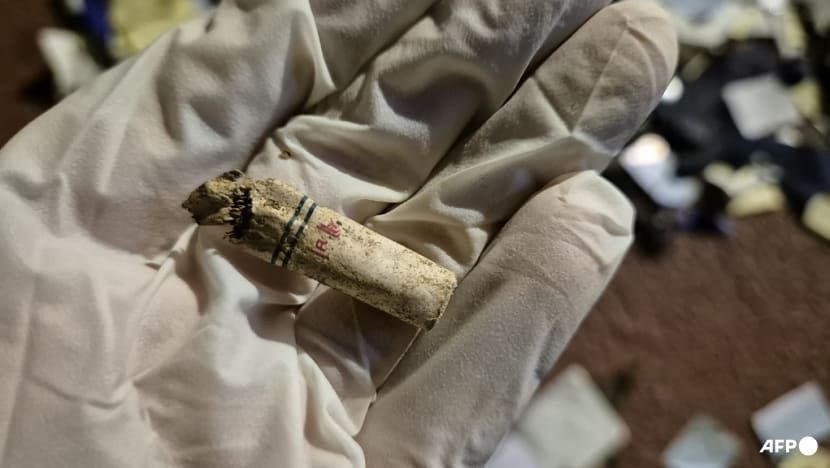Commentary: Trash balloons another sign of North Korea's refusal to act within global norms
North Korea sending trash-filled balloons to the South reflects its insouciance and recklessness when interacting with the rest of the world, says Robert Kelly of Pusan National University.


This audio is generated by an AI tool.
BUSAN, South Korea: North Korea has demonstrated yet again its refusal to meet even modest expectations for proper international behaviour. In the last few days, it launched hundreds of balloons which floated into South Korea.
These balloons were filled with trash, dirt and even manure. South Korean authorities have roped off the landing zones to ensure there are no explosives or hazardous material. No one has been hurt.
The motivation behind North Korean bad behaviour is always hard to discern. This week, North Korea’s patron, China, met with South Korea and Japan for the first time in years. Any diplomatic breakthrough among these states would bode ill for Pyongyang.
So perhaps the balloons were sent in a fit of pique over that trilateral meeting. But it appears that they were, in fact, a tit-for-tat response to South Korean non-governmental organisations releasing balloons into North Korea.
On Sunday (Jun 2), North Korea said it will “temporarily suspend” its campaign, and that their balloons have been an effective countermeasure against propaganda sent by South Korean activists.
BALLOONS IN INTER-KOREAN COMPETITION
South Korean civil society has an active anti-North Korea movement. These activists are often North Korean defectors and conservative individuals who would like to see the North collapse. Their released balloons often include audio and visual materials about South Korean life; this content is considered subversive in North Korea.
Pyongyang resents these launches and has pressured South Korean governments for decades to stop them. Balloon halts are often a part of inter-Korean detente efforts. But the current government of South Korea is conservative and inclined toward hawkish confrontation. It has not clamped down on the activists as previous progressive governments have.
There is also a constitutional, free speech problem with blocking the balloon launches in a liberal democracy like South Korea. These counter-launches appear to be North Korea’s response.
Neither side’s launches are weaponised. They are a nuisance more than anything else.
But they are a reflection of the lopsided inter-Korean competition. South Korean balloons are substantive and provide information to their recipients. North Korea, by contrast, does not bother with information or propaganda, because it knows it can persuade no one about the merits of its governance. So, it dumps trash on its opponent.
NORTH KOREA DOES WHATEVER IT WANTS
This incident, while disgusting, is harmless and of little strategic consequence. However, it reflects North Korea’s insouciance and recklessness when interacting with the rest of the world.
For example, North Korea has a long history of financial fraud and hacking. It is thus excluded from much of the global banking system.
Similarly, North Korea has a long history of trafficking people, drugs, weapons and anything it might sell on the black market. North Korea shipping is consequently highly suspect. Many ports will not take North Korean-flagged ships, and the North has set up dummy corporations in response.
Diplomatically, North Korean immaturity undercuts its ability to conduct normal relations with countries all over the world. Many will not open posts in North Korea, for fear of their diplomats’ security.
Because of economic sanctions limiting their state-allocated funds, North Korea’s embassies abroad have been reported to support their own operations by illegal means such as smuggling and money laundering.
STRATEGIC ISOLATION
The result of all this careless, provocative behaviour is isolation. And that self-created isolation is, ironically, at odds with North Korea’s long-standing goal of acceptance into the world as a peer equal with South Korea.
North Korea has definitively lost the inter-Korean competition. Its elite knows this, as do its Russian and Chinese allies. Serious regime turbulence could lead to collapse and reunification.
The solution to this existential dilemma is recognition and acceptance – for North Korea to become a proper state in the world rather than the weird, dysfunctional Korea no one likes.
Recognition would reduce the US and South Korean security threat to the North and, potentially, unlock foreign investment and aid. Hence, the North’s detente efforts with former US President Donald Trump and various progressive South Korean presidents in the past.
But all these efforts have failed, mostly because outsiders do not trust North Korea enough to make risky concessions to it. It has long been an unsocialised, truculent rogue state which would hack into the companies of other countries or traffic methamphetamine into them.
A balloon launch with trash and faeces is exactly what we expect of North Korea. It captures, in its own small way, why North Korea is still isolated and backward 35 years after the Cold War.
Robert Kelly (@Robert_E_Kelly) is a professor of political science at Pusan National University.













